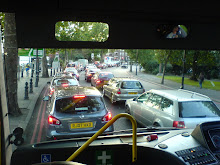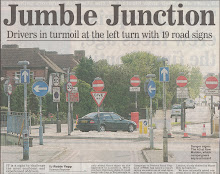ROSPA and the RAC welcome the news that 229 fewer people were killed on UK roads in 2007 than 2006. Hang on. Should we be congratulating anyone for 3,172 deaths on our roads?
"Today’s child road-death rate is not evidence that roads are safer," writes Professor John Adams. "Roads are seen as so dangerous that children are not allowed out anymore."
Most accidents are not accidents at all. They are events contrived by the rules of the road. Safety measures are doomed because they fail to address the fatal flaw at the heart of the system: priority. Priority makes roads dangerous in the first place. How? By conferring superior rights on main roads at the expense of minor road traffic and pedestrians. In all other walks of life we take our turn in the sequence in which we arrive. Not so on the roads, where main road traffic is licensed to plough on, regardless who was there first. To break the priority streams of traffic so that others can cross, in relative but not guaranteed safety, lights are "needed". Lights make us stop so we avoid the inconvenience of slowing down. They make us compete for green time. And they set up intolerable conflicts. What do you do if you’re approaching a green light at a legal 30mph and a child appears in your path but an unsighted 10-ton truck is on your tail? It doesn’t bear thinking about.
Traffic lights flout basic safety principles by taking our eyes off the road. They encourage us to speed as we try to avoid another red. They defy commonsense by making us stop when it's safe to go. They conjure congestion by making us queue consecutively instead of allowing us to filter simultaneously. They maximise fuel use and emissions by the stop-start drive cycle. All-in-all, traffic lights spell trouble.
Remove priority and you remove the "need" for lights, freeing everyone to follow their better nature and simply filter in turn. Filter in turn is how this system (or joyful absence of system) is known in the Channel Islands. In the US it is known as the all-way yield. What could be fairer, safer, or more efficient as a form of junction control?
"One thing we know for sure," says the US Best Highway Safety Practices Institute, "is that when given a choice, the vast majority act in a co-operative manner."
The trouble is, the current system deprives us of choice. In dictating our conduct, it negates our innate ability to negotiate movement. It interferes with our primary task of watching the road. It puts the onus on children to beware vehicles. Is that reasonable? No, it's unspeakable. When lights are out of action, or in "shared space" towns such as Drachten in Holland, the onus shifts to where it belongs: drivers beware pedestrians. A new hierarchy emerges with vulnerable road-users at the top. Even blind people can go in safety, because on roads free of counterproductive traffic controls, people can act on commonsense, courtesy and context.
If policymakers harnessed human nature instead of hampering it, they would see most of road safety (and congestion) problems disappear.
Although it’s not up to us to prove traffic lights are unnecessary but for the authorities to prove otherwise – something they have never done - FiT Roads is currently preparing a proposal for a lights-off trial to test the case. To be continued.
Thursday, 26 June 2008
Subscribe to:
Post Comments (Atom)


















No comments:
Post a Comment